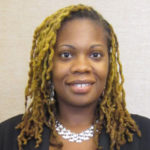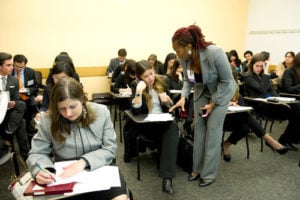Launching a Career in International Affairs
THIS GUIDE IS NO LONGER ACTIVE. For the current FP Guide, click here.
New York University School of Professional Studies,
Center for Global Affairs
MS in Global Affairs students at the NYU School of Professional Studies (NYUSPS) Center for Global Affairs (CGA) have the opportunity to meet with a career coach as often as they wish, throughout their program of study.
“We begin working with students on day one of their first semester,” says Erica Mason, associate director of the NYU Wasserman Center for Career Development at NYUSPS. “We encourage them to meet with one of our coaches every four to six weeks to create and refine their career action plan.”

“We encourage students to meet with one of our coaches every four to six weeks to create and refine their career action plan.” – Erica Mason, Associate Director, NYU Wasserman Center for Career Development at NYUSPS
Wasserman Center career coaches help students assess their interests and skills, develop goals and strategies, identify career options, and refine their skills in areas such as writing an effective résumé and interviewing for a job. Coaches also help students develop and refine a professional brand and create a strategic job search.
To help develop and maintain a professional network, NYUSPS students have access to numerous workshops on using LinkedIn. “It’s important that people understand who you are and what you do,” says Jeannie Liakaris, assistant dean of the Wasserman Center at NYUSPS. “It matters how you position your brand and use tools like Twitter and LinkedIn.”

Erica Mason working with students at the NYU Wasserman Center for Career Development at NYUSPS
Such initiatives complement the practical, applied, and interdisciplinary nature of the MS in Global Affairs program. In addition to providing job listings, on-campus recruiting, and career fairs, the Wasserman Center at NYUSPS works with faculty members to take full advantage of their connections with industry—and their expertise.
“Among employers, we see fluctuations in where the interest is,” notes Vera Jelinek, who directs the MS in Global Affairs program at NYUSPS as divisional dean of CGA. “Opportunities in the energy sector are moving toward an emphasis on renewable energy and sustainable development,” she says. Jelinek also sees transnational security as a major growth area in which employers will increasingly require expertise in such areas as terrorism, , transnational crime, resource security, and political risk analysis.
“In addition to writing and analytical skills such as data interpretation, employers seek an understanding of the issues,” says Jelinek. “In cybersecurity, employers increasingly need people with a combination of technology skills and an international relations background.”
International affairs professionals can expect to adjust their careers as employment markets evolve. “In the MS in Global Affairs program, you don’t prepare for just one career,” says Jelinek. “Many of the skills and understanding that you develop are interchangeable and interconnected.”
NYUSPS graduates continue to have access to services at the Wasserman Center at NYUSPS throughout their careers—in person and via Skype.

“It’s important that people understand who you are and what you do. It matters how you position your brand and use tools like Twitter and LinkedIn.” – Jeannie Liakaris, Assistant Dean, NYU Wasserman Center for Career Development at NYUSPS
“Your career strategy shouldn’t stop once you start a job,” says Liakaris. “It really is continual. It’s not only about building a professional brand, but about how to keep that brand fresh while keeping your network up to date.”
For more information see the Program Directory
Contents
- Launching a Career in International Affairs
- New York University School of Professional Studies (NYUSPS), Center for Global Affairs (CGA)
- Georgetown University, Walsh School of Foreign Service (SFS)
- UC San Diego, School of Global Policy and Strategy (GPS)
- Johns Hopkins University (JHU), School of Advanced International Studies (SAIS)
- The Fletcher School of Law and Diplomacy at Tufts University
- Statecraft Simulations

